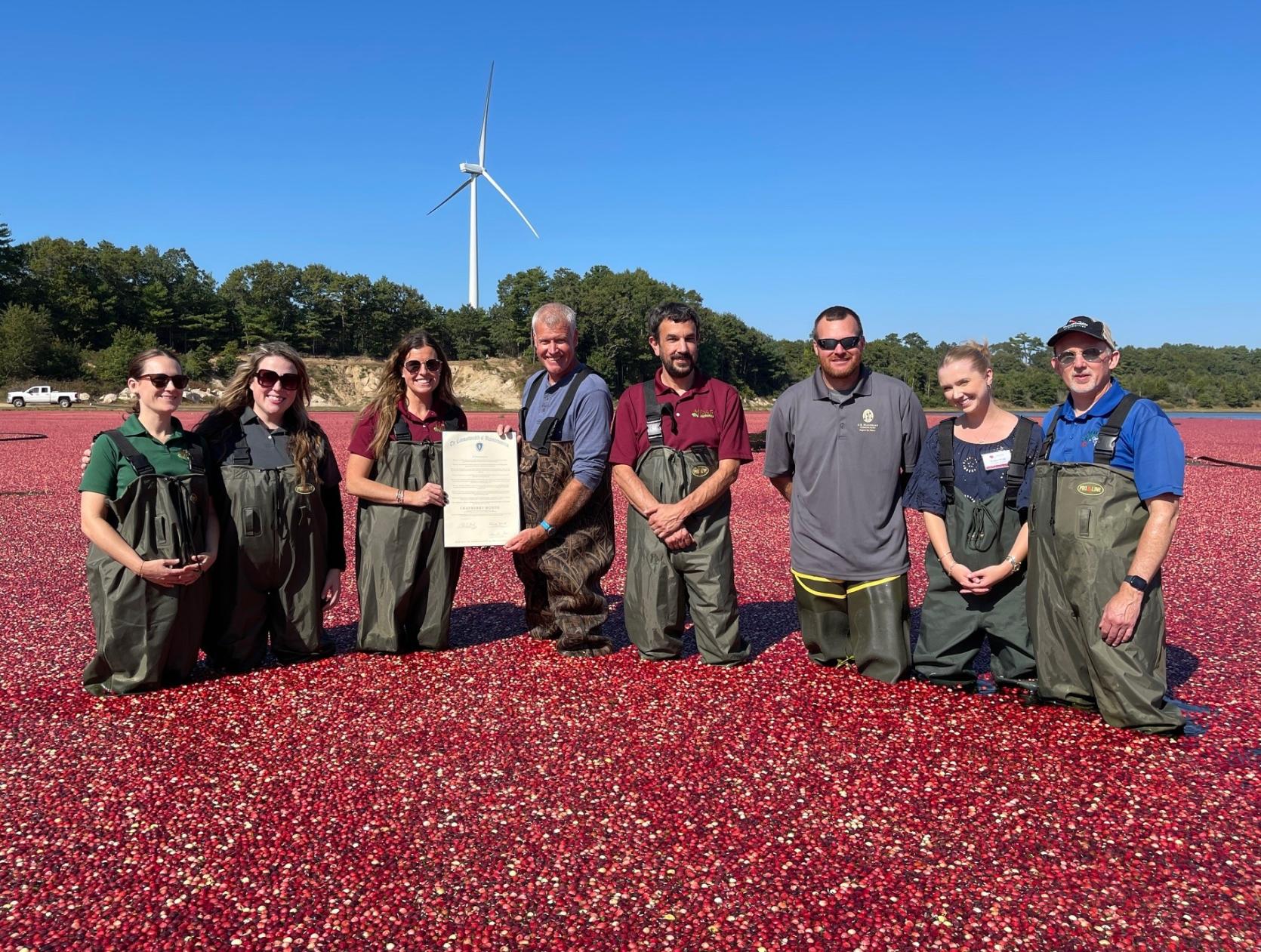- Massachusetts Department of Agricultural Resources
- Executive Office of Energy and Environmental Affairs
Media Contact
Danielle Burney, Deputy Communications Director

Plymouth — To celebrate the start of the harvest season in Massachusetts, Governor Maura Healey is declaring October “Massachusetts Cranberry Month.” Massachusetts Department of Agricultural Resources (MDAR) Commissioner Ashley Randle joined state and local officials and representatives from the Cape Cod Cranberry Growers’ Association today at Mann Farms in Plymouth to support and celebrate cranberry farmers and encourage residents to purchase Massachusetts-produced cranberry products.
“Massachusetts has a rich history of cranberry growing. This industry has long provided economic and environmental benefits, and it’s important to work with farmers to ensure the long-term viability of their farms,” said Energy and Environmental Affairs Secretary Rebecca Tepper. “Our administration stands in support of cranberry farmers. We look forward to continued collaboration in utilizing modern techniques for growing and harvesting to conserve water and protect our open spaces.”
Massachusetts has the nation’s longest history of growing cranberries. Today, there are approximately 12,000 acres of commercial cranberry bogs in the state, primarily in Plymouth, Bristol, and Barnstable counties. In 2022, the cranberry growing industry employed over 6,400 people, generating over $1.7 billion for the state, making cranberries the number one agricultural food commodity crop in Massachusetts.
“As one of the most unique and recognizable crops in our region, cranberries have been a staple at the Thanksgiving dinner table and are becoming more common as an ingredient in year-round cuisine,” said MDAR Commissioner Ashley Randle. “While I’m pleased that this year will yield a decent harvest for our cranberry farmers, we also recognize that each year poses new challenges for growers. We’re committed to working with farmers and other stakeholder partners to ensure that the cranberry sector has the tools and resources needed to effectively produce in the region year after year.”
MDAR works closely with cranberry farmers to identify best practices in water management and sustainable growing techniques to help with climate resiliency and ensure that the sector will continue to thrive in the face of unique challenges in the 21st century, such as extreme weather.
Since 2020, MDAR has awarded $3.9 million to 74 applicants for renovating 343.5 acres or growing space under the Massachusetts Cranberry Bog Renovation Enhancement Grant Program. The goal of this program is to help renovate existing cranberry bogs, providing higher yields and more efficient methods of cranberry production for participating growers.
In April 2023, the Healey-Driscoll Administration celebrated the official opening of UMass Amherst’s expanded and modernized Cranberry Station in East Wareham. This research facility supports local cranberry growers by enabling scientists to collaborate with them and share their findings on horticultural, pest, and nutrient management issues to help strengthen the industry. Funding for this expansion project was made possible by a combined $7.75 million through state capital investments, a grant from the Division of Capital Asset Management and Maintenance, and commitments from UMass Amherst.
“On behalf of all of the hard-working cranberry growers of Massachusetts, we are pleased and honored to have the Healey-Driscoll administration recognize October as Cranberry Month,” said Brian Wick, Executive Director of the Cape Cod Cranberry Growers' Association, serving growers from all of Massachusetts. “Our growers are proud to have the spotlight of this proclamation shone on their harvest, recognizing all that they have done and continue to do, to sustain their farms and the land where they are found.”
“It’s highly appropriate to name October as ‘Massachusetts Cranberry Month,’ a vital and sustainable crop that does so much to benefit the region and the Massachusetts economy,” said Senator Michael J. Rodrigues (D-Westport), Chair of the Senate Committee on Ways and Means. It is so important to keep our agricultural industry thriving, and the cranberry harvest is a great example of the strength of our rural and environmental ecosystem.”
“Massachusetts’ cranberry industry is not just a vital part of our agricultural heritage, it’s a cornerstone of our regional economy,” said State Senator Susan Moran (Plymouth & Barnstable District). “It is fitting that we are celebrating the fruit at the heart of the Commonwealth’s agricultural identity at the beginning of harvest season. We’re also recognizing the significant role that cranberry growing plays in addressing the challenges of our time, particularly the impacts of climate change. I’m grateful to the Healey-Driscoll Administration for recognizing October as Cranberry Month and for celebrating the critical contributions of our hard-working cranberry farmers.”
“I’m thrilled to see our Massachusetts Cranberry Industry recognized for its importance to our history and economy this month,” said State Representative Matt Muratore (R-Plymouth). “Our Massachusetts’ cranberry industry ranks 2nd in the Nation, conserves acres of open space, provides revenue & jobs, and deserve our support and resources to ensure cranberry production stays strong.”
###
